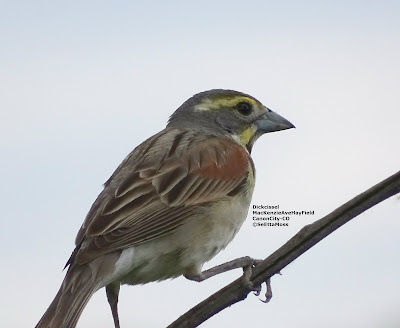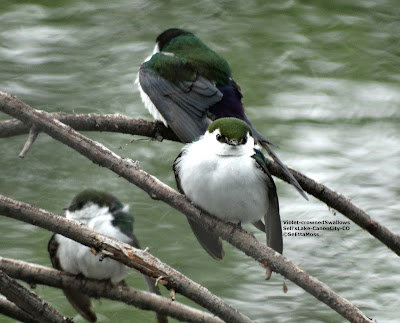Dickcissel both close up and out in the hayfield
I have spent at least a little time each day checking on the Dickcissels I found in Canon City last week-end but stayed over an hour this evening as there was a lot of action. The Dickcissels were singing maybe a little more than usual and definitely flying around a lot more than I had previously observed. I saw at least 4 territorial or sexual chases [Birds of North America BNA online defines sexual chases as "Sexual chasing is a rapid flight by male in pursuit of a female that ends abruptly on ground, where male makes physical contact with her and may pull her feathers."]--the chases were fast and too distant for me to tell if both males or male and female involved (I did observe one or more female Dickcissels today so at least one is present in this hayfield).
And the birds were coming to near the roadway to perch in the tall trees that line the fenceline so I was able to get the close-up pic above from about 20 feet away (handholding my camera). I think this close-up shows most all of the field marks for male Dickcissels (from BNA again): "Adult male has a streaked grayish head, a yellowish supercilium, white chin, thin lateral throat-stripe, black throat-patch, bright-yellow breast, light-gray belly, brown streaked back, blackish tail and wing, and chestnut shoulder."
The pic above shows a male Dickcissel singing from a perch on a tall forb out at least 60 feet into the hayfield. Even at this distance it's yellowish supercilium is fairly visible. More tomorrow about the female Dickcissels. SeEtta
And the birds were coming to near the roadway to perch in the tall trees that line the fenceline so I was able to get the close-up pic above from about 20 feet away (handholding my camera). I think this close-up shows most all of the field marks for male Dickcissels (from BNA again): "Adult male has a streaked grayish head, a yellowish supercilium, white chin, thin lateral throat-stripe, black throat-patch, bright-yellow breast, light-gray belly, brown streaked back, blackish tail and wing, and chestnut shoulder."
The pic above shows a male Dickcissel singing from a perch on a tall forb out at least 60 feet into the hayfield. Even at this distance it's yellowish supercilium is fairly visible. More tomorrow about the female Dickcissels. SeEtta




Comments